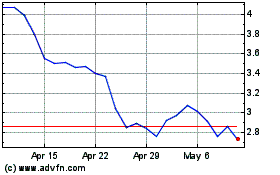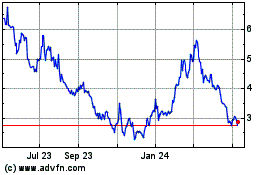Allogene Therapeutics, Inc. (Nasdaq: ALLO), a clinical-stage
biotechnology company pioneering the development of allogeneic CAR
T (AlloCAR T™) products for cancer and autoimmune disease, today
announced the publication of data from its Phase 1 ALPHA and ALPHA2
clinical studies of cemacabtagene ansegedleucel (cema-cel; formerly
ALLO-501/A) in relapsed/refractory (R/R) large B-cell lymphoma
(LBCL) as a Rapid Communication in the Journal of Clinical
Oncology. These results represent the largest dataset of LBCL
patients treated with an allogeneic CAR T product and, with a
minimum of two years of follow-up, the longest follow-up to date.
“Publication of the Phase 1 ALPHA/ALPHA2 trials in R/R LBCL mark
a landmark moment for the field. These findings represent the most
robust allogeneic CAR T experience yet presented and show, for the
first time, that an “off-the-shelf” CAR T can induce durable
complete remissions in a large fraction of patients with heavily
pretreated LBCL,” said Frederick L. Locke, MD, Chair of the
Department of Blood and Marrow Transplant and Cellular
Immunotherapy at Moffitt Cancer Center and Research Institute
(Tampa, FL). “These peer-reviewed results highlight how cema-cel
development is on the cutting edge of lymphoma care, particularly
with the ALPHA3 trial targeting only those patients who are MRD
positive at the end of first-line treatment. If successful, ALPHA3
and cema-cel could transform the treatment paradigm for newly
diagnosed patients.”
"With multiple patients in ongoing complete remissions beyond
four years, the lingering question of whether an allogeneic CAR T
could deliver durable responses has now been answered," said
Zachary Roberts, M.D., Ph.D., Executive Vice President, Research
and Development and Chief Medical Officer of Allogene.
"Furthermore, these results provide potent evidence supporting the
use of CAR T in patients with low disease burden and the unique
opportunity for the ALPHA3 trial to achieve something novel in this
disease – predict and intervene before relapse. Opportunities to
redefine the standard of care in oncology are rare, but if
successful, ALPHA3 has the potential to achieve precisely
that."
Key Findings from the PublicationThe
ALPHA/ALPHA2 studies were single-arm, multicenter, open-label,
Phase 1 trials. As of the data cutoff date (September 26, 2024), 87
heavily pretreated patients with R/R non-Hodgkin lymphoma (NHL)
were treated in the ALPHA/ALPHA2 studies between May 2019 and
September 2022. In total, 33 CD19 CAR T-naive patients with R/R
LBCL received cema-cel/ALLO-501 manufactured with the process
selected for use in pivotal studies and were the focus of this
publication.
- Overall Response Rate (ORR) and Complete Response (CR)
Rate: ORR and CR rates in the ALPHA/ALPHA2 trials were
consistent with those observed with approved autologous CD19 CAR T
cell products for patients with R/R LBCL after two or more lines of
systemic therapy. All treatment regimens studied demonstrated
clinical benefit. The selected Phase 2 regimen
(fludarabine/cyclophosphamide lymphodepletion with 90 mg of
ALLO-647 (FCA90) followed by a single dose of CAR+ cells) yielded
the highest ORR and CR of 67% and 58%, respectively.
- Durability
of Response (DOR): Patients who achieved a CR had
excellent outcomes with a median DOR, PFS (progression free
survival) and OS of 23.1 months, 24 months, and not reached,
respectively. For patients receiving the selected Phase 2 regimen,
median DOR was 23.1 months and median OS was not reached.
- Safety
Profile: The overall safety profile, including incidence
of cytopenias and infections, was manageable and consistent with
that of approved autologous CD19 CAR T cell therapies. There were
no dose-limiting toxicities, graft-versus-host disease (GvHD),
immune effector cell-associated neurotoxicity syndrome (ICANS), or
high-grade cytokine release syndrome (CRS). The most common
any-grade treatment emergent adverse events (TEAE) (≥25%) were
neutropenia (85%), anemia (67%), thrombocytopenia (58%),
infusion-related reactions (IRRs; 58%), fatigue (52%), and pyrexia
(49%), nausea (39%), lymphopenia (36%), hypotension (36%),
peripheral edema (33%), decreased white blood cell count (30%), CMV
reactivation (30%), decreased appetite (30%), chills (30%), and
hypoxia (27%).
- Time to
Treatment: The median time to start of treatment was two
days from study enrollment. In contrast, autologous CAR T cell
products require wait times often longer than 1 month despite
incremental advancements in manufacturing and supply chains.
Potential in Low Disease Burden SettingsA
growing body of evidence indicates that treatment with CAR T at
times when the disease burden is low leads to improved safety and
efficacy outcomes and this study reported similar findings. Among
patients with baseline tumor burden <1000 mm² or normal lactate
dehydrogenase (LDH) levels prior to treatment, a blood test that
indicates low disease activity, the CR rate was 100% (6/6) and 82%
(9/11), respectively. These CR rates in this subpopulation support
cema-cel as a promising therapeutic option in patients with minimum
residual disease (MRD), the population currently being studied in
the ALPHA3 trial.
Foundation for the ALPHA3 TrialThese results
serve as a foundation for the ongoing ALPHA3 trial, which is
evaluating cema-cel as a consolidation therapy in LBCL patients who
are in remission following 1L treatment but remain positive for
minimal residual disease (MRD) as detected by an ultrasensitive
ctDNA based blood test, using Foresight Diagnostics’
investigational CLARITY™ powered by PhasED-Seq™. These patients
have extremely low disease burden, a key subgroup who demonstrated
excellent disease outcomes in the ALPHA/ALPHA2 trials.
The groundbreaking randomized controlled ALPHA3 trial, initiated
in June 2024, is the first to evaluate CAR T treatment as part of
1L consolidation treatment regimen for LBCL patients who achieve
remission but test positive for MRD following initial therapy. The
ALPHA3 trial is designed to predict and intervene before relapse.
Cema-cel is administered only to patients at high risk for relapse
as a one-time consolidation dose before disease recurs.
About Cemacabtagene Ansegedleucel
(cema-cel)Cemacabtagene ansegedleucel, or cema-cel, is a
next generation anti-CD19 AlloCAR T™ investigational product for
the treatment of large B cell lymphoma (LBCL). In June 2022, the
U.S. Food and Drug Administration granted Regenerative Medicine
Advanced Therapy (RMAT) designation to cema-cel in r/r LBCL. The
ALPHA3 pivotal Phase 2 trial in first line (1L) consolidation for
the treatment of LBCL launched in June 2024. Allogene has oncology
rights to cema-cel in the US, EU and UK with options for rights in
China and Japan.
About the ALPHA3 TrialOver 60,000 patients are
expected to be treated for LBCL annually in the US, the EU and the
UK. While first line (1L) R-CHOP or other chemoimmunotherapy is
effective for most patients, approximately 30% will relapse and
require subsequent treatment. The current standard of care (SOC)
after 1L treatment has been simply to “watch and wait” to see if
the disease relapses. The pivotal Phase 2 ALPHA3 study takes
advantage of cema-cel as a one-time, off-the-shelf treatment that
can be administered immediately upon discovery of MRD following six
cycles of R-CHOP or other chemoimmunotherapy, positioning it to
become the standard “7th cycle” of frontline treatment available to
all eligible patients with MRD.
About Allogene TherapeuticsAllogene
Therapeutics, with headquarters in South San Francisco, is a
clinical-stage biotechnology company pioneering the development of
allogeneic chimeric antigen receptor T cell (AlloCAR T™) products
for cancer and autoimmune disease. Led by a management team with
significant experience in cell therapy, Allogene is developing a
pipeline of “off-the-shelf” CAR T cell product candidates with the
goal of delivering readily available cell therapy on-demand, more
reliably, and at greater scale to more patients. For more
information, please visit www.allogene.com, and follow Allogene
Therapeutics on X and LinkedIn.
Cautionary Note on Forward-Looking Statements for
Allogene This press release contains forward-looking
statements for purposes of the safe harbor provisions of the
Private Securities Litigation Reform Act of 1995. This press
release may, in some cases, use terms such as “develop,”
“potential,” “likely to,” “expect,” “can,” “see if,” “positioning,”
“become,” “may,” “could,” “indicates,” “leads to,” “supports,”
“promising,” “designed to,” “predict,” or “will,” including
alternative forms thereof, or other words that convey uncertainty
of future events or outcomes to identify these forward-looking
statements. Forward-looking statements include statements regarding
intentions, beliefs, projections, outlook, analyses or current
expectations concerning, among other things: ALPHA3 being a pivotal
trial and the extent to which it will support regulatory approval
of cema-cel; the potential for the ALPHA3 trial and an
investigational minimal residual disease test to identify patients
with LBCL who are likely to relapse following standard 1L
treatment; the potential for cema-cel to become the standard “7th
cycle” of frontline treatment; the potential for cema-cel to have
comparable efficacy to autologous CD19 CAR Ts; the potential for
cemal-cel to have a manageable safety profile consistent with
approved autologous CD19 CAR T; the potential for an off-the-shelf
CAR T to induce durable complete remissions in a large fraction of
patients with LBCL; that ALPHA3 and cema-cel could fundamentally
alter the treatment paradigm for newly diagnosed patients; the
design of the ALPHA3 trial and expected benefits therefrom; the
potential for ALPHA3 trial to predict and intervene before relapse
and establish a new standard of first-line LBCL treatment; that
cema-cel could be a promising therapeutic option for patients with
MRD; that cema-cel can be administered immediately upon discovery
of MRD following six cycles of R-CHOP or other chemoimmunotherapy;
the timing for completion of ALPHA3 enrollment or cema-cel BLA
submission; the incidence of LBCL including the extent to which
patients will relapse and require subsequent treatment; the
potential for our product candidates to be approved; the potential
benefits of the ALPHA3 trial and of AlloCAR T™ products; that
treatment with CAR T at times when the disease burden is low leads
to improved safety and efficacy outcomes; cema-cel’s safety
profile; our ability to deliver cell therapy on-demand, more
reliably, and at greater scale to more patients. Various factors
may cause material differences between Allogene’s expectations and
actual results, including, risks and uncertainties related to: the
limited nature of our Phase 1 data from the ALPHA/ALPHA2 trial and
the extent to which such data may or may not be validated in the
ALPHA3 trial and any future clinical trials; the ability and extent
that cema-cel will be administered only to patients at high risk
for relapse as a one-time consolidation dose before disease
recurrence; the extent to which the Food and Drug Administration
disagrees with our clinical or regulatory plans or the import of
our clinical results, which could cause future delays to our
clinical trials or require additional clinical trials; we may
encounter difficulties enrolling patients in our clinical trials;
we may not be able to demonstrate the safety and efficacy of our
product candidates in our clinical trials, which could prevent or
delay regulatory approval and commercialization; and challenges
with manufacturing or optimizing manufacturing of our product
candidates. These and other risks are discussed in greater detail
in Allogene’s filings with the Securities and Exchange Commission
(SEC), including without limitation under the “Risk Factors”
heading in its Quarterly Report on Form 10-Q for the quarter ended
September 30, 2024. Any forward-looking statements that are made in
this press release speak only as of the date of this press release.
Allogene assumes no obligation to update the forward-looking
statements whether as a result of new information, future events or
otherwise, after the date of this press release.
AlloCAR T™ is a trademark of Allogene Therapeutics, Inc.CLARITY™
and PhasED-Seq™ are trademarks of Foresight Diagnostics.
Allogene’s investigational AlloCAR T™ oncology products utilize
Cellectis technologies. These anti-CD19 products are developed
based on an exclusive license granted by Cellectis to Servier.
Servier, which has an exclusive license to the anti-CD19 AlloCAR T™
investigational products from Cellectis, has granted Allogene
exclusive rights to these products in the U.S., all EU Member
States and the United Kingdom.
Allogene Media/Investor Contact:Christine
CassianoEVP, Chief Corporate Affairs & Brand Strategy
OfficerChristine.Cassiano@allogene.com
Allogene Therapeutics (NASDAQ:ALLO)
Historical Stock Chart
From Jan 2025 to Feb 2025

Allogene Therapeutics (NASDAQ:ALLO)
Historical Stock Chart
From Feb 2024 to Feb 2025
